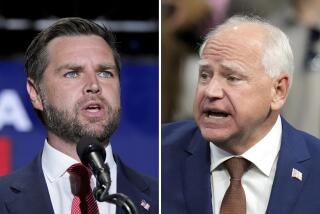A Slow Dance Where Strategy Calls the Tune
- Share via
SACRAMENTO — It’s as predictable as autumn brush fires and falling leaves. If it’s late September and it’s an election year, there are candidates doing the debate dance.
There’s an underdog desperately pursuing a front-runner, who’s playing it coy. Let’s debate , pleads the underdog. I’m not ready , says the front-runner. The news media provide the music, and the host gets nervous.
For most people watching, this isn’t at all interesting. But the dancers and the host become agitated. And this fall they seem unusually agitated; also silly.
“We’re not going to let him squirrel out of this one,” vows a spokesman for state Treasurer Kathleen Brown. “(We’ll) ferret out the governor. . . . Flush him out of his hole.” Another spokesman puts on a chicken suit and pickets the governor.
The Democratic gubernatorial candidate--who still hasn’t defined herself to millions of voters--buys TV time for an ad showing a live weasel. “Pop Goes the Weasel” plays in the background. It’s supposed to symbolize Gov. Pete Wilson weaseling out of debates.
*
This is straight out of Political Strategy 1A and every voter is very familiar with it.
Wilson has overtaken Brown in the polls and the new underdog is eager for debates to reverse the front-runner’s momentum. Wilson would accept one or two debates--on his terms--but why risk any more than that when everything is going so smoothly?
The situation was just the opposite during the Democratic primary. Then it was front-runner Brown trying to minimize her exposure to TV debates. She ultimately did two local debates in Northern California.
“Is she pure in a negotiating sense? No,” concedes a Brown strategist.
From a reporter’s perspective, the most sensible comment I ever heard on this subject came two decades ago from Richard Bergholz, a longtime political writer for The Times, now retired. Bergholz sat stoically listening to a campaign aide passionately explain how his boss was being victimized by a debate-dodging, cowardly opponent.
“When you have a debate, we’ll cover it,” Bergholz finally told the aide. “We don’t cover debates over debates.”
But, of course, we do get sucked into it, because the news media thrive on confrontation. That doesn’t mean the public stays up late waiting to hear whether any candidates have set a debate date.
“One man in California cares about having a debate and that’s Vic Biondi,” says a political consultant who doesn’t work for either gubernatorial candidate.
Biondi represents a nervous would-be host, the California Broadcasters Assn., which has been trying to organize a Wilson-Brown debate for a statewide TV network. Biondi, the CBA director, has been producing debates for years.
This has been a unique debate over a debate because most negotiations have not been between the two candidates. They’ve been between the CBA and the governor. And they’ve been bitter.
Brown bowed out three weeks ago, announcing she’d accept any debate format. Since then, she’s relegated herself to ridiculing the governor’s demands, trying to persuade voters--with squirrels, ferrets, chickens and weasels--that he’s arrogantly ducking her.
*
In a nutshell, Biondi--a former TV reporter--decided it was time to force radical changes in political debates.
The traditional “Meet the Press” format with a panel of political reporters asking questions “only served to slow down” the action, he wrote the candidates. Brown agreed and, according to a Wilson staff memo, her negotiators “argued that reporters tend to hog the spotlight . . . big egos drive (them) to ask hardball questions designed to gain personal attention.”
Biondi proposed a variety of formats, mostly in the Phil Donahue mode. He suggested having a moderator and/or live audience ask all questions. Later, he unilaterally announced the show would be one-third reporters’ questions, one-third call-ins and one-third candidates querying each other. Finally, he offered to let reporters ask all the questions with the aid of viewer call-ins, faxes and e-mail.
This is no time to experiment, Wilson thought. Do it the safe, old-fashioned way: reporters--mutually agreed to by each candidate--asking questions on any subject. Biondi said the time had passed when candidates could dictate debate terms. The governor said bye-bye.
So a network of PBS-TV stations is offering a prime-time debate using Wilson’s format. But now Brown is balking, saying few people watch PBS. Asserts an adviser: “If it’s a debate in a closet, the answer’s no.” The underdog will debate on PBS only if there’s a second debate on commercial TV.
They’re not dancing in sync, and it’s ugly.
More to Read
Get the L.A. Times Politics newsletter
Deeply reported insights into legislation, politics and policy from Sacramento, Washington and beyond. In your inbox twice per week.
You may occasionally receive promotional content from the Los Angeles Times.








